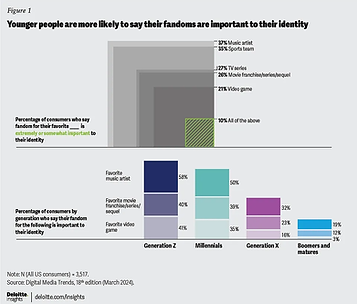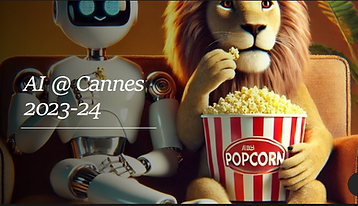


The world is emotionally burnt out and financially divided.
Concert tickets that cost a week’s wages. Expensive sneaker drops that sell out in seconds. Football matches priced beyond the reach of the working-class fans who built the culture.
This isn’t just about rising prices, it’s about rising tension.
People are paying to belong, which, it turns out, has become really expensive.
They know that no one in power gives a damn, so they seek out communities that help them feel safe, happy, alive, and connected.
They’re spending money on products that give them credibility. It's a proof that they’re part of something even if it means paying more than it’s worth.
Brands have taken advantage of this and offered people ways to showcase that belonging. Spotify flipped the script on fan merch: its Super Fan Collection wasn’t available to everyone, only to the top 1% of listeners of each artist. At a time when everyone’s trying to buy their way into culture, Spotify rewarded real fandom.
This year, Škoda skipped the clichés of car advertising altogether and handed over the keys, literally to a Reddit community that already loved the Octavia. By inviting die-hard fans to design and test-drive the car before the press, Škoda turned passive loyalty into creative ownership.
In a time when everything feels more expensive, people aren’t chasing luxury.
They’re chasing belonging.
And the brands that truly give a damn?
They don’t just sell products.
They show up and make people feel seen.
Here’s the full piece that I’ve written: https://lnkd.in/dWnAb8ad


Community → Certainty → Consumption is a piece I wrote to explore how fandoms offer a sense of certainty in an unpredictable world and why that matters for brands. It looks at how people turn to communities not just for entertainment or identity, but for emotional security. Especially in a time when the world feels increasingly fragmented, these spaces provide something to hold on to.
I used Expectancy-Value Theory to unpack how people stay loyal to what they love, even when things aren’t going their way like football fans who stick with their club, stay active in FPL, and continue showing up in chats and forums. The piece also looks at how fandoms today are shaped by decentralised platforms such as Reddit, Discord, meme pages where real connections happen.
It’s filled with examples like LoFi Beats Suicide, where a YouTube chat helped save someone’s life, and Sundeep Jaswal’s unexpected FPL win at 50+. Moments like that show how community isn't just content, it's a support system. And increasingly, this is where people place their trust. Not in ads, but in each other.
That shift from marketing at people to building with them is what this piece is really about. And it’s where I think brand strategy is headed.
You can read the full piece here.
Objective
Enhance inclusivity by making McDonald’s dining experience accessible for disabled customers, improving brand sentiment and awareness.
Challenge
The burger's two-handed ritual silently excluded disabled Indians who felt embarrassed instead of enjoying the burger.
Insight
While restauarants wore accessibility badges, the intimate dance of food and fingers remained inaccessible. Accessibility stopped at the door, never reaching the table where true inclusion belongs.
Creative Idea
McDonald's launched EatQual, a specially designed burger packaging that enabled people with disabilities to eat comfortably using one hand. The launch was timed to coincide with the International Day for Persons with Disabilities (December 3) and was supported by a social media and influencer campaign. The campaign featured a heartwarming video of a young disabled girl enjoying her burger, alongside endorsements from Paralympic athletes and influencers from the disabled community. The initiative was promoted through social media, PR, influencer partnerships, and in-store events.
Results
-
13.4M impressions, 11.1M reach.
-
67% increase in brand interest, 36% rise in spontaneous awareness.
-
Brand trust scores up 33%, reaching an all-time high.
-
Widely recognized, winning multiple industry awards, including Warc, Effie, and Spikes Asia.
Here's the case study
Objective
Encourage Indian youth to vote in the elections by making them realize the importance of their choice and their impact on the country's future. Drive brand engagement and increase in-store guest count.
Challenge
McDonald's often served as a popular gathering place for Indian youth during holidays, including election days when many chose to socialize rather than head to the polling stations.
Insight
A paradox of India's democracy: young citizens who debate politics fervently online yet skip voting day. Their passionate digital opinions never translate to ballot power, creating a generation whose political influence remains all talk, no action.
Creative Idea
McDonald's "Make Your Choice" campaign turned its menu into a statement on voter participation. Non-voters at the restaurant received different orders, prompting reflection on their choice. A filmed social experiment sparked online discussions, while real-time posts visualized voter turnout using McDonald’s food. In-store activations reinforced the message with self-ordering kiosks, polling booth locators, and special offers for voters. Customers could also share voting selfies to be featured on McDonald’s digital platforms, making participation a point of pride.
Results
-
Brand score increased from 11% to 13%.
-
Earned media worth $4.2 million on a $48,000 investment (88x ROI)
Here's the case study
McDonald's Reopening (Post-COVID)

Objective
Reassure customers about McDonald's commitment to hygiene and safety while reinforcing the brand’s consistency in taste and quality.
Insight
In a world where everything has changed—how we work, socialize, and go about daily life, people crave familiarity and comfort. Some changes might be permanent, but in times of uncertainty, the reassurance of something familiar can be comforting.
Creative Idea
Everything has changed yet some things haven’t.
Execution
The campaign showcases how life has evolved, with new norms shaping daily routines. However, amidst these changes, McDonald’s remains a constant, offering the same great taste and trusted experience. Through visuals of everyday moments, the film highlights McDonald’s commitment to providing a safe yet unchanged experience, reinforcing that while the world may be different, some things like the joy of McDonald’s stay the same.
Here are the TV Spots - Golden Guarantee, Take Out & McDelivery
Objective
Carve out a unique identity for Kwality Wall’s in an ice cream market filled with similar-looking brands and drive stronger brand recall and engagement.
Challenge
Break away from the category norm of indulgent, drool-worthy visuals by introducing a fresh, distinctive brand personality. Instead of just showcasing
ice cream as a product, position it as a fun, joyful escape from the seriousness of everyday life, making it more emotionally engaging for consumers.
Insight
In a world that feels heavier than ever, consumers crave lighthearted escapes in their everyday lives. Ice cream, with its playful nostalgia and indulgent simplicity, isn’t just a treat—it’s a tiny rebellion against the mundane, turning ordinary moments into joyful breaks from reality.
Creative Idea
‘Goodbye Serious’—a campaign that reimagined ice cream as a source of lighthearted fun. Instead of typical product-centric ads, the brand used witty, humorous messaging to bring joy into everyday situations, making the experience of seeing the ads as delightful as eating the ice cream itself.
Here's the case study

For its first NBA 2K campaign, the adam&eveDDB US team wanted to explore how football and EA Sports FIFA have achieved global dominance. It was my chance to take a shot and bring my passion for football into play. This deck covers football’s cultural and emotional significance, the influence of clubs, fans, players, and tournaments, and how EA Sports seamlessly integrates these elements to deliver an immersive and authentic gaming experience. By blurring the lines between real football and the virtual game, EA Sports FIFA has created a world where the two complement each other—bringing the sport closer to fans than ever before. This set of insights served as a springboard for the NBA 2K campaigns.
The content and the presentation format has been changed to protect confidential details.


This comprehensive research delves into the mindset, challenges, and worldview of today’s youth. Drawing a striking parallel to Cassandra from Greek mythology, whose warnings were ignored by those in power - it sheds light on Gen Z’s sharp awareness of global crises, economic instability, and political shortcomings. Despite their foresight, their concerns are often dismissed, a disregard that significantly impacts their mental health. The study emphasizes the urgent need for brands to rethink their strategies, align authentically with Gen Z’s core values, and engage meaningfully by fostering community-driven solutions. It also highlights the importance of embracing Gen Z’s bold and unconventional communication style. This deck has served as a vital resource for multiple offices working on
Gen Z-focused initiatives. Here's the summary deck.
The content and the presentation format has been changed to protect confidential details.


Analyzed 300+ Cannes 2023-24 winning campaigns to understand how brands have leveraged AI in fame-driven storytelling. Rather than merely showcasing technological advancements, brands are using AI to build trust, enhance human connections, gamify experiences, improve accessibility, and challenge societal biases. Here's the deck.
Beyond AI’s role, I also identified emerging communication themes based on the winners, providing DDB teams with a reference point for campaigns aligned with these trends. This exercise offered insights into the best creative work in the market, shaping strategic and creative thinking across offices.
For instance, underdog narratives are more impactful than ever, and stories centered on women are gaining prominence. WhatsApp’s We Are Ayenda followed the Afghan girls' youth football team as they used WhatsApp to stay connected and rebuild their dreams, showcasing resilience against all odds. Similarly, Orange’s Women’s Football tricked viewers into thinking they were watching men’s highlights only to reveal female players, thus delivering a powerful statement on gender recognition in sports.






